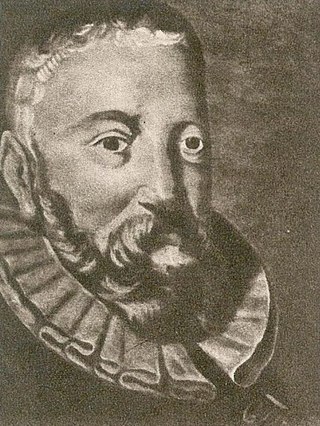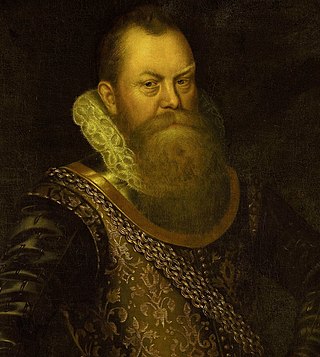Related Research Articles

Year 1571 (MDLXXI) was a common year starting on Monday of the Julian calendar.

The maritime European exploration of Australia consisted of several waves of European seafarers who sailed the edges of the Australian continent. Dutch navigators were the first Europeans known to have explored and mapped the Australian coastline. The first documented encounter was that of Dutch navigator Willem Janszoon, in 1606. Dutch seafarers also visited the west and north coasts of the continent, as did French explorers.

The Houtman Abrolhos is a chain of 122 islands and associated coral reefs, in the Indian Ocean off the west coast of Australia, about 80 km (50 mi) west of Geraldton, Western Australia. It is the southernmost true coral reef in the Indian Ocean, and one of the highest latitude reef systems in the world. It is one of the world's most important seabird breeding sites, and is the centre of Western Australia's largest single-species fishery, the western rock lobster fishery. It has a small seasonal population of fishermen, and a limited number of tourists are permitted for day trips, but most of the land area is off limits as conservation habitat. It is well known as the site of numerous shipwrecks, the most famous being the Dutch ships Batavia, which was wrecked in 1629, and Zeewijk, wrecked in 1727.

Cornelis de Houtman was a Dutch merchant seaman who commanded the first Dutch expedition to the East Indies. Although the voyage was difficult and yielded only a modest profit, Houtman showed that the Portuguese monopoly on the spice trade was vulnerable. A flurry of Dutch trading voyages followed, eventually leading to the displacement of the Portuguese and the establishment of a Dutch monopoly on spice trading in the East Indies.
This article contains information about the literary events and publications of 1560.

Dirk Hartog was a 17th-century Dutch sailor and explorer. Dirk Hartog's expedition was the second European group to land in Australia and the first to leave behind an artefact to record his visit, the Hartog Plate. His name is sometimes alternatively spelled Dirck Hartog or Dierick Hartochszch. Ernest Giles referred to him as Theodoric Hartog. The Western Australian island Dirk Hartog Island is named after Hartog.
The year 1603 in science and technology involved some significant events.

Frederick de Houtman was a Dutch explorer, navigator, and colonial governor who sailed on the first Dutch expedition to the East Indies from 1595 until 1597, during which time he made observations of the southern celestial hemisphere and contributed to the creation of 12 new southern constellations.
The year 1627 in science and technology involved some significant events.
Edward Sutton, 4th Baron Dudley. The oldest son and heir of John Sutton, 3rd Baron Dudley. He was an English nobleman and soldier. Contemporary sources also refer to him as Sir Edward Dudley.

Philemon Holland was an English schoolmaster, physician and translator. He is known for the first English translations of several works by Livy, Pliny the Elder, and Plutarch, and also for translating William Camden's Britannia into English.
Pieter Dirkszoon Keyser was a Dutch navigator and celestial cartographer who mapped several constellations on the southern celestial hemisphere.

Eendrachtsland or Eendraghtsland was derived from the Dutch het Landt van d'Eendracht or Land van de Eendracht and was one of the earliest names given by Europeans to Australia, being in use for 28 years, from 1616 until 1644.

Caert van't Landt van d'Eendracht is a 1627 map by Hessel Gerritsz. One of the earliest maps of Australia, it shows what little was then known of the west coast, based on a number of voyages beginning with the 1616 voyage of Dirk Hartog, when he named Eendrachtsland after his ship.
Thirteen ships of the Dutch East India Company and its pre-companies have been named Amsterdam.
Houtman or De Houtman is a Dutch surname. Translating as "(the) woodman", the origin of the name may be toponymic or occupational. Notable people with the surname include:
Thomas Byng was an English academic and lawyer, Master of Clare Hall, Cambridge from 1571.

The First Dutch Expedition to East Indies was an expedition that took place from 1595 to 1597. It was instrumental in opening up the Indonesian spice trade to the merchants that eventually formed the Dutch East India Company, and marked the end of the Portuguese Empire's dominance in the region.
Abraham Holland was an English poet. He was the son of the translator, Philemon Holland, and the brother of the printer, Henry Holland. His best known work is the Naumachia, a poem on the Battle of Lepanto in 1571.
References
- ↑ Daumas, Maurice (1989). Scientific Instruments of the Seventeenth and Eighteenth Centuries and Their Makers. London: Portman. ISBN 978-0-7134-0727-3.
- ↑ Lohuizen, J. Van. "Houtman, Frederik de (1571–1627)". Australian Dictionary of Biography. National Centre of Biography, Australian National University. Retrieved 3 April 2018.